ADDRESS OF MISS JANE ADDAMS BEFORE THE RESOLUTIONS COMMITTEE, DEMOCRATIC NATIONAL CONVENTION
Miss Addams said, "I have been asked to speak for a number of organizations calling themselves the Emergency Peace Committee, which includes The American Friends' Service Committee; The Fellowship of Reconciliation; The Women's International League for Peace and Freedom; the Committee on Militarism in Education, and a number of others.
"We venture to submit various suggestions to the Resolutions ↑Committee↓ of the Democratic Convention. First, we hope that your honorable committee will recommend: Legislation to make possible control of traffic in arms as a necessary part of the Outlawry of War.
"We regard with horror the results of unrestricted trade in armaments and of the profits derived from their manufacture and sale, and we believe that an important step in disarmament could be secured by international agreement among the governments as to the nationalization of arms and munitions, which would not only eliminate private profits accruing to the great armament factories but also reduce war scares. That such scares are from time to time deliberately fomented by them was made quite clear by an American citizen representing munitions interests at a recent international conference for the reduction of armaments.
"The situation in regard to the uselessness of armaments is moving very rapidly; only last January [dispatches] sent by our government to both China and Japan enunciated a new principle in international law, simply that illegal force shall not result in legal gain, that territorial adjustment obtained by methods contrary to the Kellogg Pact shall have no standing with the United States. In a resolution adopted by the League of Nations' Assembly on March 11th this principle was agreed upon by all the nations adhering to the League. The present situation naturally suggests the question, 'Why seek to gain by war that which the world refuses to concede? Why impoverish a nation for elaborate defense when the organized opinion of the world stands ready to deny the aggressor the fruits of his aggression? In short, why prepare for war at all?’ [page 2]
"In this fast moving world disarmament was a wild dream 25 years ago. Until yesterday it was a laborious matter of matching tonnage and war-planes. Tomorrow it will become the obvious course of getting rid of what is no longer useful.
"We wish the United States might enunciate another principle of international law; the protection of nationals in foreign countries shall be taken care of solely through civil processes and without the intervention of the Navy and the Marines. There is no doubt that Japan thought she was following a regular method in her pacification of Manchuria, not realizing that the method had become obsolete, at least for her. We believe that the enunciation of such a doctrine, made universal, would deal a body blow at Imperialism all over the world and enormously reduce the large navies. During 1931 the world spent five billion dollars on useless armament. In that very year half the governments were bankrupt, millions of men and women were unemployed with myriads of children [undernourished] and countless numbers of families faced actual starvation. It will be increasingly difficult to defend such folly.
"Further, the societies I represent would submit these suggestions: In the field of Foreign Relations, we stand for policies aiming to further friendly and cooperative relations between all peoples whose interdependence becomes closer every year. To this end, we propose a revival of world trade a lower tariff, cancellation of debts and reparations, and recognition of the de facto government of Russia.
"They further urge increasing our participation in the work of the League of Nations, and participation by our government in international conferences on economic problems of vital importance to world recovery such as equitable allocation of natural resources, currencies and credits, etc. We believe that a revival of world trade could be secured through lower tariffs because it becomes more and more evident that the mobility of goods and freedom of trade intercourse is essential to world prosperity. For the same reason we also advocate the cancellation of war debts and reparations.
"Further, we believe that the adjustment of the whole questions of war debts [page 3] and reparations is essential to world prosperity. Mr. Hoover has appointed so many commissions that surely the Democrats when they come into power may be permitted one more. Let such a commission on war debts go into the whole question -- drag right out into the open the situation created by the fact that some American states could not pay their war debts to foreign governments. An analysis of the debts, owed us would show that much of the indebtedness is for material and munitions bought in this country at excessive war prices, and used in a common cause.
"Perhaps what the world needs more than anything else at this moment is an outbreak of good will and human understanding to overwhelm the suspicion and distrust which has paralyzed trade and poisoned every relationship. Nothing could achieve this so quickly and so powerfully as a statement by the United States that the war debts were being considered generously and impartially. On the same basis we urge a recognition of the de facto government of Russia, although we realize that such a matter would ordinarily be one for administration rather than party policy. We believe that it might be easier to bring about this much needed release if it were made a party concern. We hope this is not too much to ask, and we venture to remind you that Thomas Jefferson when he recognized Russia did not commit himself to the government of the Czar. If we can clear out of the way some of these hard nubbins of ill-will, our chances for peace would be enormously enhanced."

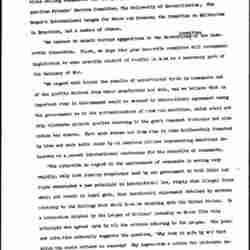
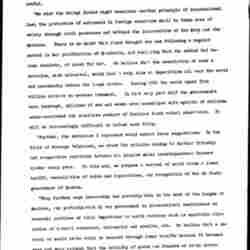
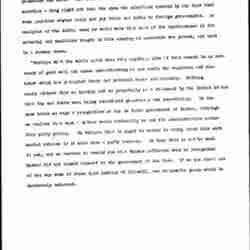









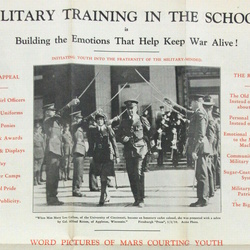
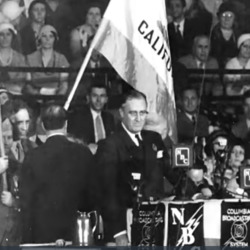

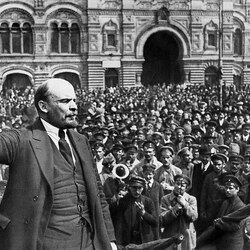
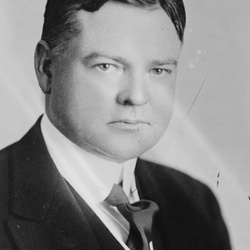

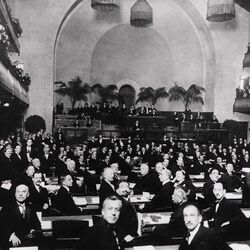

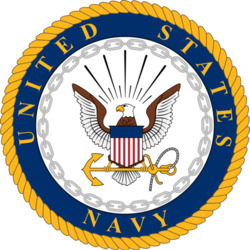


Comments